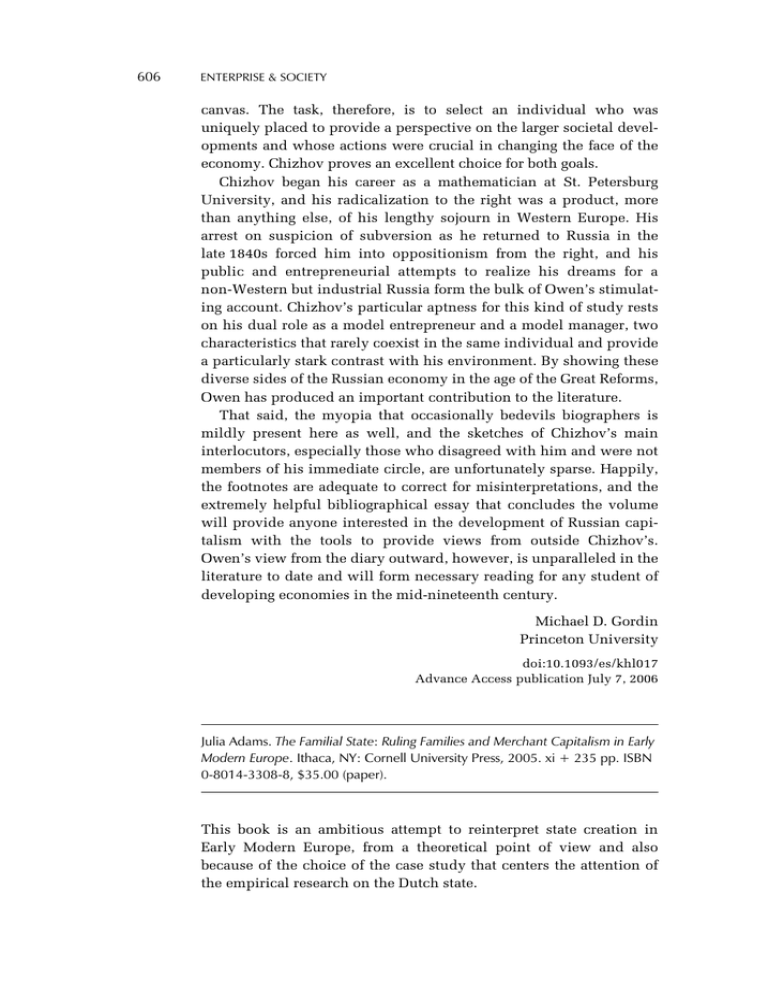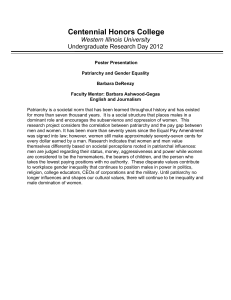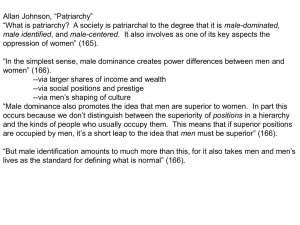606 canvas. The task, therefore, is to select an individual who... uniquely placed to provide a perspective on the larger societal...
advertisement

606 ENTERPRISE & SOCIETY canvas. The task, therefore, is to select an individual who was uniquely placed to provide a perspective on the larger societal developments and whose actions were crucial in changing the face of the economy. Chizhov proves an excellent choice for both goals. Chizhov began his career as a mathematician at St. Petersburg University, and his radicalization to the right was a product, more than anything else, of his lengthy sojourn in Western Europe. His arrest on suspicion of subversion as he returned to Russia in the late 1840s forced him into oppositionism from the right, and his public and entrepreneurial attempts to realize his dreams for a non-Western but industrial Russia form the bulk of Owen’s stimulating account. Chizhov’s particular aptness for this kind of study rests on his dual role as a model entrepreneur and a model manager, two characteristics that rarely coexist in the same individual and provide a particularly stark contrast with his environment. By showing these diverse sides of the Russian economy in the age of the Great Reforms, Owen has produced an important contribution to the literature. That said, the myopia that occasionally bedevils biographers is mildly present here as well, and the sketches of Chizhov’s main interlocutors, especially those who disagreed with him and were not members of his immediate circle, are unfortunately sparse. Happily, the footnotes are adequate to correct for misinterpretations, and the extremely helpful bibliographical essay that concludes the volume will provide anyone interested in the development of Russian capitalism with the tools to provide views from outside Chizhov’s. Owen’s view from the diary outward, however, is unparalleled in the literature to date and will form necessary reading for any student of developing economies in the mid-nineteenth century. Michael D. Gordin Princeton University doi:10.1093/es/khl017 Advance Access publication July 7, 2006 Julia Adams. The Familial State: Ruling Families and Merchant Capitalism in Early Modern Europe. Ithaca, NY: Cornell University Press, 2005. xi + 235 pp. ISBN 0-8014-3308-8, $35.00 (paper). This book is an ambitious attempt to reinterpret state creation in Early Modern Europe, from a theoretical point of view and also because of the choice of the case study that centers the attention of the empirical research on the Dutch state. Reviews To begin with theory, Julia Adams goes back to Weberian theories about the ideal type of patriarchal patrimonialism. Patrimonial practices were traditional, but Max Weber stated that they could set in motion fundamental transformations like chartered companies, whose explorations expanded accumulation and cultural domination. Adams reviews, perhaps a bit too superficially, the ideas of some of the most important “second wave” historical sociologists in the United States and their interpretations about early modern European politics, which many believe displaced “modernization theory” as the dominant social science paradigm in the interpretation of multiple European political transitions and early modern revolutions in the 1970s and 1980s. For Adams, this “second wave” of U.S. sociologists and their holistic explanation of the transition to modernity are in crisis. Her book would be in fact a sign of such a crisis. A major goal of the book is, in effect, to show that patriarchy cannot simply be added as an additional factor in the interpretations about emergent political systems but must be interpreted as a fundamental way of exercising power that defined the early modern patrimonial state. Regarding the empirical case study selected to test the importance of patriarchy in the re-definition of emergent European states in the seventeenth and eighteenth centuries, the Dutch state is an intriguing and intelligent choice. The author is well aware of that. She acknowledges that the popular and scholarly image of the United Provinces is typically one of individualistic burghers and not patriarchal power—a capitalist enclave hemmed in by continental feudalisms, a burgher republic very different from the French aristocratic absolutism, and the English mixed monarchical/estatist system. Adams is very successful in demonstrating that despite the enormous differences among these three countries, there were striking and important similarities, as family heads collectively devised ways to grasp their privileges more tightly and invented forms of patriarchal political authority. The book is organized into an introduction and six chapters. The first chapter presents theories about state formation and the main ideas about patriarchalism and patrimonial state. Chapters two and three describe corporate conflict and state making in the Dutch Golden Age and the rise of the Netherlands. Chapter four concentrates on familiar states and chartered companies in eighteenthcentury Europe. Chapters five and six present, on the one hand, the case of the Dutch decline and the importance of patriarchy in a supposedly “bourgeois” state and, on the other, the differences in eighteenth-century France and England. The first key question the book tries to answer is: Why did not the ruling elite of the Netherlands mobilize their Golden Age wealth to 607 608 ENTERPRISE & SOCIETY create a strong state to maintain the conditions of their flourishing mercantile system? Strong states made possible and secured world hegemony, according to Adams, so why did the Netherlands fail to realize this and do something about it? Probably, the main weakness of the book is not the answer but the question itself. There are manifold cases of strong states that do not secure world hegemony or economic growth. The other big question is explaining the decline of the Netherlands in the eighteenth century, after the golden age of the seventeenth century. Adams tries to demonstrate that patriarchalism was not only a condition for economic success but also a reason for political decline. That is not very convincing. It assumes that in France or in England, patriarchalism did not play the role it played in the Netherlands, that stronger powers displaced patriarchy in the control of economic resources at state level. But this was not true at all. Politics in Europe since at least the middle ages was based on patriarchy, and this was true until the nineteenth-century liberal constitutions and revolutions and afterward in many southern European countries. The book is very attractive for sociologists and for economic and social historians interested in “macro” contrasts and big relevant questions about social and political life. The book’s argument about the importance patriarchy plays in the definition of the new states in Europe is extremely important. Further readings about southern European countries would probably yield high returns to anyone interested in the role of the familial state in the definition of political conditions to protect or guarantee the elite’s wealth. Patriarchy was very much alive in those areas until very recently. Paloma Fernández Pérez Universitat de Barcelona doi:10.1093/es/khl025 Advance Access publication July 10, 2006 François Caron, ed. Les grandes Compagnies de chemin de fer en France, 1823–1937. Geneva, Switzerland: Librairie Droz, 2005. 411 pp. ISBN 2-600-00942-6, €41.61 (paper). This is a book that is hard to describe and hard to review. It is certainly not an ordinary study of railway history but a kind of broad survey, based on a series of financial reports concerning the great French private railway companies, as drawn up between 1882 and






